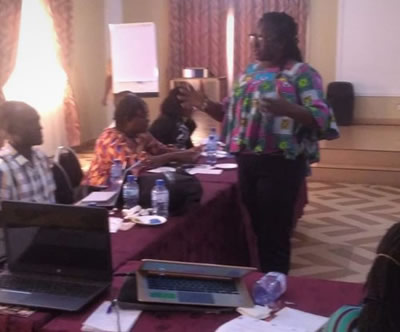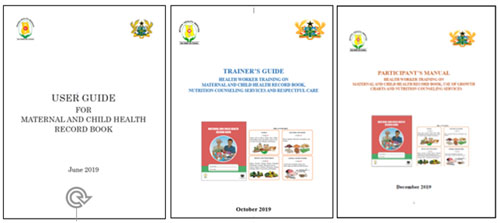- Home
- Technical Cooperation Projects
- Index of Countries
- Africa
- Ghana
- Project for Improving Continuum of Care for Mothers and Children through the introduction of Combined MCH Record Book
- Project News
- Development of Operational Guidelines and Training Materials for Nutrition Counseling Services and Respectful Care
Project News
2019-09-30
Development of Operational Guidelines and Training Materials for Nutrition Counseling Services and Respectful Care
Background
In Ghana, despite successes achieved in reducing malnutrition in all physiological groups, the burden of malnutrition especially women and children across the country remains unacceptably high with emerging issues around the increasing prevalence of overweight and obesity. Poor and sub-optimal feeding practices are key contributory factors to the prevailing nutrition and health status. Available evidence suggests that nutrition education and counseling support optimal gestational weight gain, reduce the risk of anaemia in late pregnancy, increase birth weight, and lower the risk of preterm delivery. Yet, nutrition counseling services are not well-integrated into the routine Maternal, Newborn and Child Health services in Ghana.
The national roll-out of the combined Maternal and Child Health Record Book (MCHRB) offers a great opportunity for improving the delivery of integrated MCH and Nutrition services and strengthening continuum of care. The impact of nutrition counseling depends upon the quality of the counseling and the extent to which pregnant women/caregivers understand and adopt recommended practices. This is why health care providers should be fully equipped with the skills of providing nutrition counseling with respectful manners and communication skills.
Development of Operational Guidelines on Nutrition Counseling Services and Respectful Care (NCSRC)
Operational Guidelines on Nutrition Counseling Services and Respectful Care (NCSRC) were developed to guide the health professionals in carrying out nutrition counseling services and respectful care efficiently and effectively utilizing the MCH RB. Several meetings were conducted first with members of Reproductive and Child Health, and Nutrition departments of Family Health Division, then a workshop was conducted in Ashanti region, on 6th September 2019, for consensus building. It was attended by key health and nutrition stakeholders from various regions to validate the guidelines. The participants were divided into three groups and reviewed the different parts of the guidelines and proposed the revisions at the plenary session. The contents of the guidelines include: Approach and components of Nutrition Counseling Services, Organization of Nutrition Counseling Services, Process of Nutrition Counseling for Pregnant and Lactating Women and for Children, Community Component of Nutrition Counseling Services, Respectful, Patient-Centered and Individualized Care and Mentoring, and Supportive supervision system.
 Ms. Esi Amoaful, Deputy Director Nutrition, Family Health Division, GHS explains guidelines
Ms. Esi Amoaful, Deputy Director Nutrition, Family Health Division, GHS explains guidelines
While the draft of the Operational Guideline will be modified further in the course of the implementation of NCSRC in 11 districts in Ashanti region, the basic concept of the guideline was agreed at the workshop as below:
Aim:
To establish Nutrition Counselling Services that will strengthen the delivery of basic nutrition services for all pregnant and lactating women and caregivers of children
Special emphasis:
Women and children with conditions requiring special care such as anemic and malnourished women and children
Focus:
To promote health and well-being and prevent severe health problems developing at all stages of life by supporting clients and their families/communities to adopt healthy dietary practices and other related behaviours to enhance growth and development and prevent malnutrition
Main objective
To integrate and strengthen nutrition counselling services to promote adoption of appropriate dietary and feeding practices and other nutrition-related behaviours
Specific Objectives
- To improve competence and skills for effective nutrition counselling
- To equip/empower caregivers to adopt optimal nutrition practices
- To outline the minimum package of nutrition services to be integrated into the existing service delivery system for women and children
- To guide the integration and improvement of nutrition counselling service
Development of Training Materials
Parallel to the development of the Operational Guidelines, a team of core national facilitators and JICA experts started to develop training materials for health worker training on effective utilization of MCHRB, Nutrition Counseling Services and Respectful Care. In addition to the existing training modules for effective utilization of MCHRB, modules on Basic Nutrition and Health and Nutrition Messages, Nutrition Counseling and Respectful Care, Field Practice, and Strengthening Nutrition Counseling Services were developed for the health worker training. Trainer's Guide and Participant's Manual were composed to guide both the facilitators and participants during the training. The complete training package for the health worker training now includes MCH RB education purpose, User Guide, Trainer's Guide and Participant's Manual.

Next Step
The team will start Health Worker Training in 11 focus districts in Ashanti region in October 2019. Through the training using well-designed, easy-to-follow materials, we expect the participants to be equipped with the necessary knowledge and skills to operationalize Nutrition Counseling Service and Respectful Care utilizing the MCH RB at their facilities.
- About JICA
- News & Features
- Countries & Regions
- Our Work
- Thematic Issues
- Types of Assistance
- Partnerships with Other Development Partners
- Climate Change / Environmental and Social Considerations
- Evaluations
- Compliance and Anti-corruption
- Science and Technology Cooperation on Global Issues
- Research
- JICA Development Studies Program / JICA Chair
- Support for the Acceptance of Foreign HRs / Multicultural and Inclusive Community
- Publications
- Investor Relations
